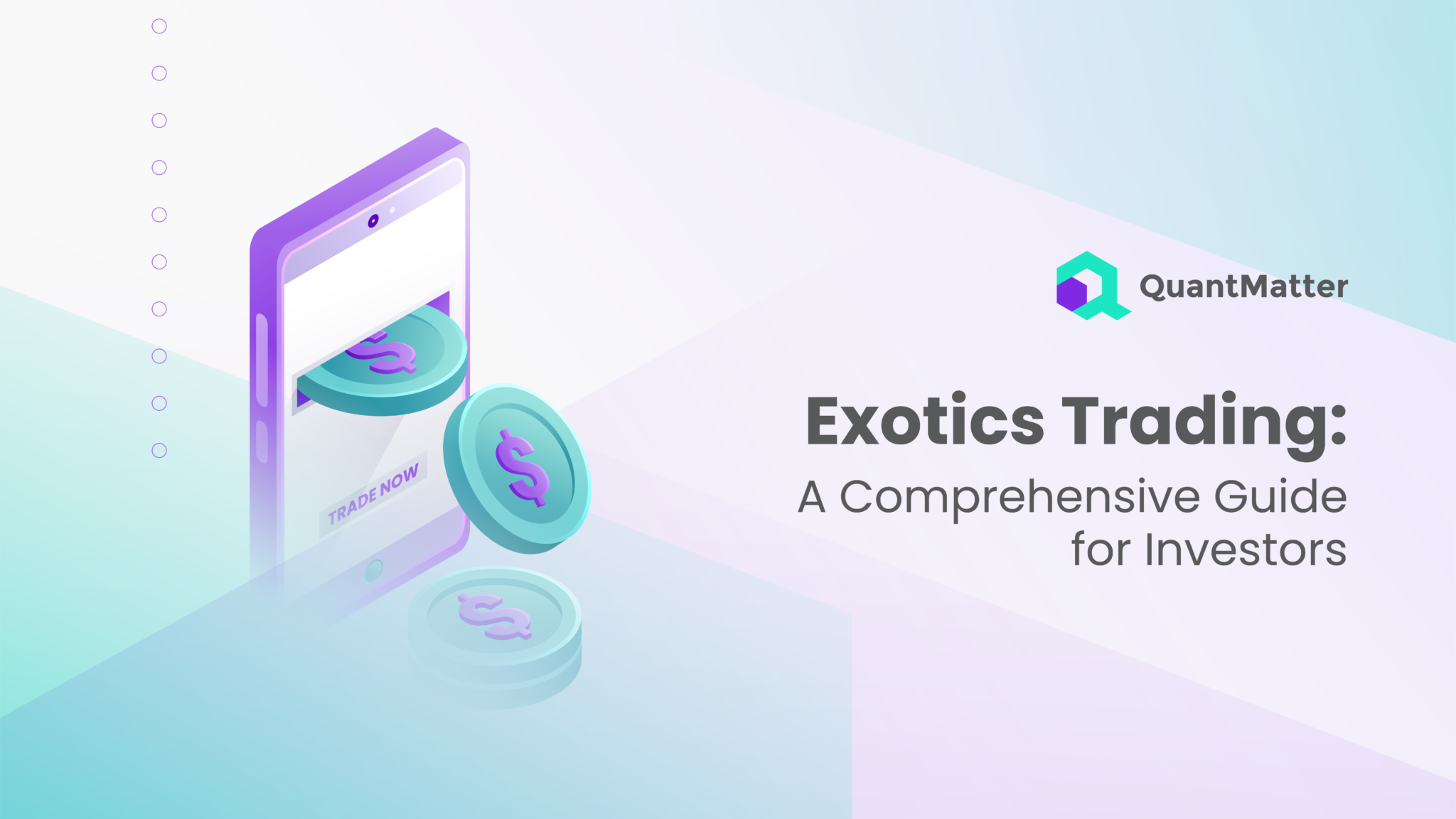
Exotics trading is a specialized area of the financial markets that involves trading complex financial instruments. These instruments, often referred to as exotic options, differ from standard options due to their unique features and payoffs. While exotics trading can offer higher returns, it also comes with increased risks, making it essential for investors to thoroughly understand the market before diving in.
For many investors, the allure of exotics trading lies in the potential for substantial profits. However, the complexity of these financial products requires a solid grasp of the underlying principles. Without proper knowledge, the risks can quickly overshadow the benefits, leading to significant losses.
This guide aims to provide a clear and concise overview of exotics trading, including the types of exotic options, the strategies involved, and the risks associated with this form of trading. Whether you’re a seasoned investor or new to the world of trading, this guide will help you navigate the complexities of exotics trading.
What is Exotics Trading?

Exotics trading involves the buying and selling of exotic options, which are financial derivatives with more complex structures than standard options. Unlike vanilla options, which have straightforward payoffs, exotic options can have various features that make them more challenging to value and trade.
Exotic options are often customized to meet specific investment needs, allowing investors to tailor their strategies to their risk tolerance and market outlook. These options can include barriers, lookbacks, and digital options, each offering unique payoffs based on the movement of underlying assets.
Also Read: 12 Best MFE Programs to Consider in 2024
Because of their complexity, exotic options are typically traded over-the-counter (OTC) rather than on standardized exchanges. This means that the terms of the options can be customized, but it also adds an element of counterparty risk, as the trade is not guaranteed by a central exchange.
Types of Exotic Options

Exotic options represent a complex yet intriguing subset of the options market, offering tailored solutions for sophisticated investors seeking specific outcomes. These options differ from standard vanilla options in that they often include more intricate features and conditions, which can either amplify gains or magnify risks. As such, understanding the various types of exotic options is essential for any investor aiming to navigate this nuanced landscape. Below, we explore the key types of exotic options, each with its distinct characteristics, benefits, and potential drawbacks.
1. Barrier Options
Barrier options introduce a conditional element that sets them apart from traditional options. These options either come into existence or expire upon the underlying asset reaching a predetermined price level, known as the barrier. The two primary variations of barrier options are knock-in and knock-out options. Knock-in options are inactive at the start but become effective when the asset’s price hits the barrier.
Conversely, knock-out options are initially active but become void once the barrier is breached. This conditional nature of barrier options adds an element of strategy, allowing investors to potentially benefit from specific price movements while also introducing the risk of the option being deactivated or not activating at all.
2. Lookback Options
Lookback options offer a unique feature that sets them apart from other options—they allow the holder to “look back” over the life of the option and select the most favorable price point for the underlying asset. This retrospective ability means that the holder can secure the best possible strike price, whether it’s the lowest price for a call option or the highest price for a put option.
This significantly reduces the risk associated with choosing an unfavorable strike price and can potentially enhance the profitability of the trade. However, this flexibility comes at a premium, as lookback options tend to be more expensive due to the reduced risk and potential for higher returns.
3. Digital Options
Also known as binary options, digital options simplify the decision-making process by offering an all-or-nothing payout structure. If the underlying asset’s price is above or below a predetermined level at expiration, the option pays out a fixed amount, regardless of how far the price has moved.
This straightforward nature makes digital options appealing to traders who prefer a clear and defined risk/reward scenario. However, the simplicity of digital options belies the risks involved; they are inherently speculative and can result in a total loss of the premium if the asset doesn’t finish in the money.
4. Asian Options
Asian options distinguish themselves by being based on the average price of the underlying asset over a specified period, rather than the asset’s price at a particular point in time. This averaging process reduces the impact of extreme price movements, thereby mitigating volatility and providing a more stable outcome for the holder.
Asian options can be particularly useful in markets where price fluctuations are unpredictable, as they offer a more measured approach to options trading. However, the averaging effect also means that the potential for extraordinary gains is dampened, making them less attractive to traders seeking higher risk and reward scenarios.
5. Compound Options
Compound options introduce an additional layer of complexity by allowing the holder to purchase or sell another option at a specific price. In essence, a compound option is an option on an option, creating a multi-tiered structure that can be tailored to meet complex trading strategies.
These options are particularly useful for hedging or speculating on the price movement of other options and are often used by advanced traders who require sophisticated tools to manage risk and leverage opportunities. However, the added complexity of compound options also means they carry higher risks, and their pricing can be challenging to model and understand.
Strategies for Exotics Trading

Exotics trading strategies are as diverse as the options themselves. The choice of strategy depends on the investor’s objectives, risk tolerance, and market outlook. Below are some common strategies used in exotics trading.
Hedging
One of the primary uses of exotic options is hedging against potential losses in other investments. Exotic options, with their customizable features, allow investors to protect their portfolios from adverse price movements. For instance, barrier options, which either activate or deactivate at a certain price level, can serve as a protective measure against significant fluctuations in the underlying asset. By incorporating these options into a broader hedging strategy, investors can minimize the impact of market volatility on their overall portfolio. This approach is particularly useful in uncertain markets where traditional hedging instruments might not provide sufficient coverage.
Speculation
Speculation is another common strategy in exotic options trading, where investors aim to capitalize on anticipated market movements. Unlike standard options, exotic options like digital options offer all-or-nothing payouts, making them attractive to those willing to take higher risks for potentially higher rewards. Digital options, in particular, allow speculators to bet on whether the price of an underlying asset will reach a specific level by a certain time. If the prediction is correct, the payoff can be substantial. However, if the market moves in the opposite direction, the loss is equally significant, underscoring the high-risk, high-reward nature of speculation with exotic options.
Yield Enhancement
Exotic options can also be employed to enhance the yield on an investment portfolio. Yield enhancement strategies involve using options to generate additional income or returns beyond what the underlying assets might offer on their own. For example, an investor might sell a lookback option, which allows the holder to exercise the option at the most favorable price over a specific period. By doing so, the investor collects a premium, boosting the portfolio’s overall yield, while still retaining the potential to benefit from favorable price movements. This strategy can be particularly effective in a stable or moderately volatile market, where the risk of significant adverse price movements is lower.
Arbitrage
Arbitrage strategies in exotic options trading involve exploiting price discrepancies between different markets or financial instruments. These strategies require a deep understanding of both the exotic options and the underlying assets, as well as the ability to act quickly on observed opportunities. For instance, an investor might use exotic options in conjunction with other financial instruments to take advantage of price differentials in different markets. The complexity of these strategies often means they are best suited for experienced traders with a strong grasp of market dynamics and the ability to navigate the intricate pricing structures of exotic options.
Tailored Exposure
Finally, exotic options can be used to create tailored exposure to specific market scenarios that might be difficult or impossible to achieve with standard options. For example, Asian options, which pay out based on the average price of the underlying asset over a set period, are ideal for smoothing out the effects of short-term volatility. This can be particularly useful for investors who are concerned about sudden, sharp movements in the market but still want to participate in longer-term trends. By using exotic options to fine-tune their exposure, investors can create highly customized positions that align closely with their market outlook and risk tolerance.
Risks Involved in Exotics Trading
While exotics trading offers opportunities for profit, it also comes with significant risks. These risks can be more complex and harder to manage than those associated with standard options.
- Market Risk: Like all financial instruments, exotic options are subject to market risk. However, the complex features of these options can amplify the impact of market movements, leading to larger-than-expected losses.
- Liquidity Risk: Because exotic options are often traded OTC, they can be less liquid than standard options. This means it may be harder to enter or exit a position, especially in volatile markets.
- Counterparty Risk: In OTC markets, there is always the risk that the counterparty may default on the contract. This risk is more pronounced in exotic options due to their complexity and the bespoke nature of the contracts.
- Valuation Risk: The complex features of exotic options make them harder to value. Incorrect valuation can lead to poor investment decisions, as the investor may not fully understand the potential outcomes of the trade.
- Regulatory Risk: The OTC nature of exotics trading also means it is less regulated than trading on exchanges. Regulatory changes can impact the market for exotic options, potentially leading to losses.
How to Get Started with Exotics Trading
For those interested in entering the world of exotics trading, it’s important to take a cautious and informed approach. Here are some steps to help you get started:
- Education: Before diving into exotics trading, it’s crucial to educate yourself. This involves not only understanding the different types of exotic options but also grasping the strategies and risks involved. Consider taking courses or reading books on derivatives trading.
- Start Small: When you first start trading exotic options, it’s wise to begin with small positions. This allows you to gain experience without risking large amounts of capital. As you become more comfortable with the market, you can gradually increase your exposure.
- Use a Demo Account: Many brokers offer demo accounts where you can practice trading with virtual money. This can be a valuable tool for testing strategies and gaining confidence before committing real capital.
Also Read: 10 Best Quant Forum to Check this 2024
- Choose the Right Broker: Since exotic options are typically traded OTC, choosing a reputable broker is essential. Look for a broker with a strong track record in derivatives trading and one that offers a wide range of exotic options.
- Monitor the Market: Exotics trading requires constant monitoring of the market, as prices can change rapidly. Stay informed about market trends and be prepared to adjust your strategies as needed.
- Seek Professional Advice: Given the complexity of exotics trading, it may be beneficial to consult with a financial advisor or a professional trader. They can provide insights and help you navigate the market.
Conclusion
Exotics trading is a fascinating and potentially profitable area of the financial markets. However, it is not without its challenges. The complexity of exotic options means that they are best suited for experienced investors who are willing to invest the time and effort required to understand them fully.
For those who are up to the challenge, exotics trading can offer unique opportunities for profit, as well as the ability to tailor strategies to specific market conditions. However, it’s essential to approach this market with caution, as the risks can be significant.
By educating yourself, starting small, and seeking professional advice, you can navigate the complexities of exotics trading and potentially achieve your investment goals. Remember, in the world of exotic options, knowledge truly is power.
Disclaimer: The information provided by Quant Matter in this article is intended for general informational purposes and does not reflect the company’s opinion. It is not intended as investment advice or a recommendation. Readers are strongly advised to conduct their own thorough research and consult with a qualified financial advisor before making any financial decisions.

I'm Carina, a passionate crypto trader, analyst, and enthusiast. With years of experience in the thrilling world of cryptocurrency, I have dedicated my time to understanding the complexities and trends of this ever-evolving industry.
Through my expertise, I strive to empower individuals with the knowledge and tools they need to navigate the exciting realm of digital assets. Whether you're a seasoned investor or a curious beginner, I'm here to share valuable insights, practical tips, and comprehensive analyses to help you make informed decisions in the crypto space.
- Carinahttps://quantmatter.com/author/carina/
- Carinahttps://quantmatter.com/author/carina/
- Carinahttps://quantmatter.com/author/carina/
- Carinahttps://quantmatter.com/author/carina/
